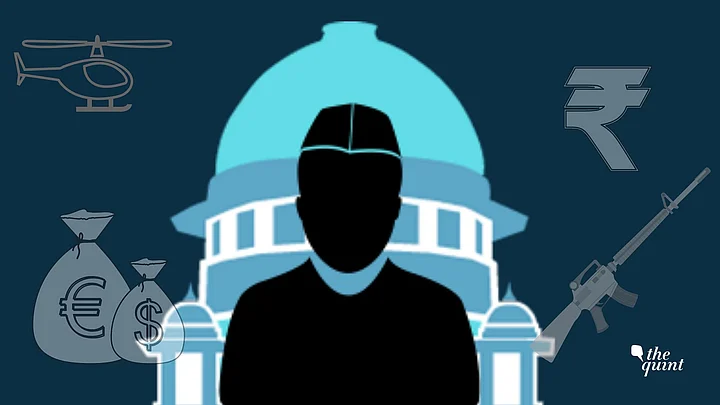The Supreme Court on Tuesday, 10 August, directed that political parties in India must publish any existing criminal antecedents of candidates within 48 hours of their selection, and ordered them to make such information available on the homepage of their websites. It also directed the Election Commission of India (ECI) to make such information available to the public via a mobile app and awareness campaigns.
The court also fined eight political parties for non-compliance of the Supreme Court's orders with regards to the decalaration of the criminal antecedents of candidates during the Bihar Assembly elections that concluded in November last year.
In a bid to 'decriminalise politics', the apex court modified an earlier judgement which had directed that such information must be published within 48 hours of the selection of the candidate, or not less than two weeks prior to the first date for filing of nominations, whichever is earlier.
A bench of comprising Justices RF Nariman and BR Gavai on Tuesday changed paragraph 4.4 of the judgment dated 13 February 2020, limiting it to 48 hours only.
Criminal Antecedents on ECI Mobile App, Party Websites
The apex court on Tuesday ordered political parties to upload details of candidates with criminal backgrounds on the homepage of the respective party website. The court also made it necessary to have on the homepage a link with a caption which states 'candidates with criminal antecedents'.
It also directed the ECI to create a mobile application containing information regarding their criminal antecedents and ordered that it conducts an awareness campaign to make every voter aware about the criminal antecedents of all contesting candidates ahead of the elections via social media, TV ads, prime time debates, etc.
The Election commission has also been told to constitute a cell to monitor the compliance of its orders by political parties and apprise it in case of non-compliance.
"The ECI shall bring such non-compliance by the political party to the notice of this Court as being in contempt of this Court’s Orders/directions, which shall in future be viewed very seriously," the court said, as quoted by Bar&Bench.
The court also directed ECI to allocate funds to carry out these exercies within four weeks.
"Candidates With Criminal Antecedents Shouldn't Become Lawmakers, But..."
The Supreme Court in its observations made some strong observations with regards to decriminalising the political system and said that people with criminal antecedents should not be allowed to become lawmakers.
However, the bench did not issue any order in this regard citing the absence of a legislative system in place to implement any such orders.
"Our hands are tied, we can only appeal to the conscience of the lawmaker," the court said, as quoted by LiveLaw.
"In view of the constitutional scheme of separation of powers, though we desire that something urgently requires to be done in the matter, our hands are tied and we cannot transgress into the area reserved for the legislative arm of the State," it added.
However, the court also observed that the possibility of a 'rival implicating someone falsely, as a political vendetta, is not unknown in the country'.
"In such a situation, a political party can always give a reason that a candidate with criminal antecedents is found to be more suitable than a person who does not have criminal antecedents. The reasons could be many. If the political party is of the prima facie opinion that such a candidate has been falsely implicated, it can say so," the bench said, as quoted by LiveLaw.
8 Parties Fined
While the Communist Party of India (Marxist) and Nationalist Congress Party (NCP) were fined Rs 5 lakh each for total non-compliance, six other parties - the, BJP, Congress, Janata Dal United (JDU), CPI, Rashtriya Janta Dal (RJD), and Lok Jan Shakti Party were fined Rs 1 lakh for partial non-compliance.
What Was the Petition Filed and Why?
A Bench of Justices Rohinton Fali Nariman and BR Gavai delivered the judgment on contempt petitions filed by Brajesh Singh and Manish Kumar, who alleged that the Court’s earlier directions passed on February 13, 2020, were not complied with by political parties during the Bihar Assembly Elections.
The court was considering a request made by Amicus Curiae Senior Advocate KV Viswanathan that it should issue a direction to the ECI to take requisite action under relevant clauses against political parties who flout the directions.
The petitions called for the symbols of the said political parties to be suspended in light of their alleged contempt of the Supreme Court's judgment from February 2020, reported NDTV.
The judgment had stated that it would be mandatory for political parties to upload on the website detailed information about candidates with pending criminal cases. This information was required to include the nature of the offences as well as relevant particulars, as well as reasons for the selection of such a candidate and why others with no antecedents had not been selected.
The information was also to be published on social media as well as one local vernacular newspaper and one national one, the verdict had made clear.
(With inputs from NDTV, Bar&bench and LiveLaw)
(At The Quint, we question everything. Play an active role in shaping our journalism by becoming a member today.)
